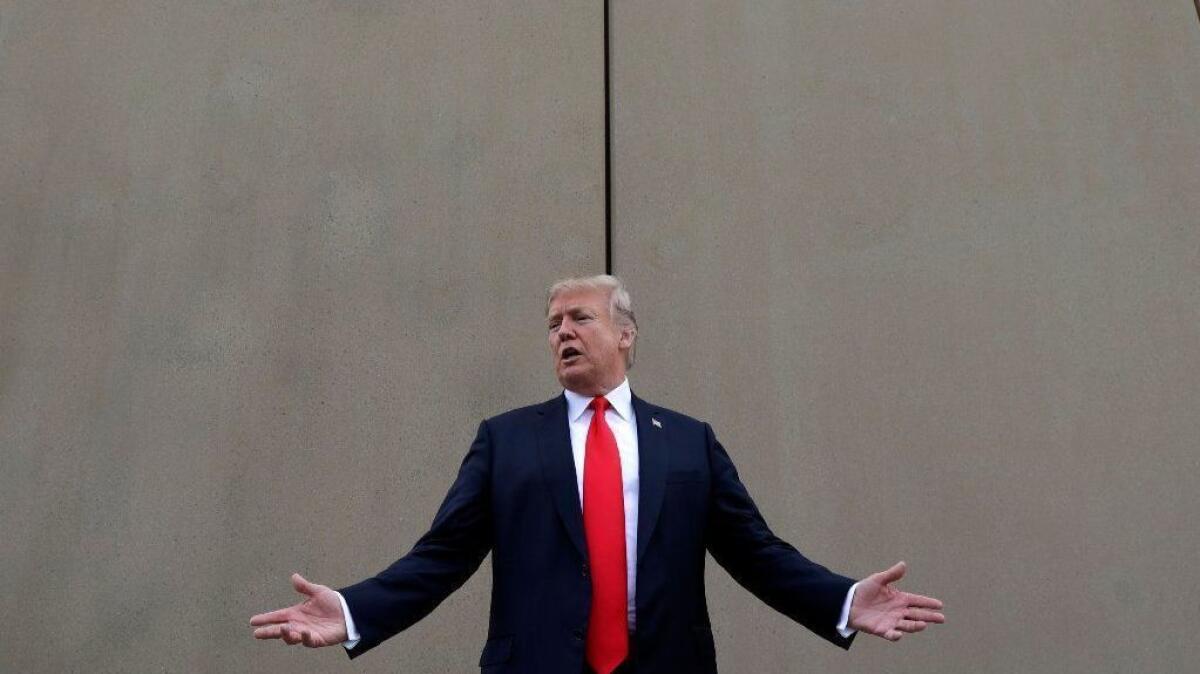Trump urged by New York Times publisher to stop his inflammatory rhetoric against the media

Reporting from Washington — The meeting was off the record; the topic was fraught.
And in what has become a hallmark of Donald Trump’s presidency, two very different versions emerged Sunday of a face-to-face discussion behind closed doors — this one held July 20 between Trump and A.G. Sulzberger, the publisher of the New York Times.
In a morning tweet from his New Jersey golf resort, Trump said he and Sulzberger had talked about “the vast amounts of Fake News being put out by the media & how that Fake News has morphed into phrase, ‘Enemy of the People.’”
He added: “Sad!”
Attacks on the news media were a staple of Trump’s 2016 campaign, and during his 18 months in office, the president has used the phrase “fake news” as a near-daily rallying cry to describe coverage critical of his administration.
Sulzberger, 37, who took over the publisher’s post in January, said in a statement Sunday that he had used the encounter with Trump to warn against the use of anti-media rhetoric that he characterized as “not just divisive but increasingly dangerous.”
“I told him that although the phrase ‘fake news’ is untrue and harmful, I am far more concerned about his labeling journalists ‘the enemy of the people,’” Sulzberger said in the statement, which was issued shortly after Trump’s tweet. “I warned that this inflammatory language is contributing to a rise in threats against journalists and will lead to violence.”
The contradictory tone of the accounts of Trump’s meeting with the publisher — with the president implying that the two men had together lamented a problem not of the president’s making — came as questions continued to swirl around Trump’s meeting this month with Russian President Vladimir Putin.
The White House has refused to provide specifics of the closed-door talks between the two leaders in Helsinki, with only translators present. Russian officials have referred to a number of purported agreements, and senior U.S. intelligence officials appeared to have been kept in the dark about important aspects of the discussion.
The Trump-Sulzberger exchange came as Trump surrogates fanned out Sunday to tout the president’s economic policies and attack the credibility of the president’s former “fixer” Michael Cohen, who is showing signs that he is turning against his longtime patron.
Trump’s lawyer Rudolph W. Giuliani, appearing on “Fox News Sunday,” called Cohen a “pathological manipulator.” He decried as false news reports citing Cohen as saying Trump knew of a June 2016 meeting between senior campaign officials and Kremlin-connected figures who purportedly offered damaging information about Trump’s opponent Hillary Clinton. Trump has denied knowing about the meeting.
Appearing on the same show, Treasury Secretary Steven T. Mnuchin predicted robust economic growth would continue, although many mainstream economists caution that a 4.1% spurt in the growth of gross domestic product in the second quarter of this year could be short-lived.
“I don’t think this is a one- or two-year phenomenon,” Mnuchin said of the latest quarterly figures, which some have attributed to U.S. goods being snapped up in anticipation of Trump-levied tariffs. “I think we definitely are in a period of four or five years of sustained 3% growth at least.”
White House senior economic advisor Larry Kudlow, interviewed on CNN’s “State of the Union,” said Trump deserved a “victory lap” on the economy. Republicans are hoping to parlay economic strength into maintaining their congressional majorities in November’s midterm elections.
As that vote draws near, the president has assailed negative news coverage of events such as the Putin meeting, his June summit with North Korean leader Kim Jong Un and his administration’s since-rescinded policy of separating parents and children who cross the U.S. border illegally. In a tweet on Sunday, Trump threatened a government shutdown if Democrats in Congress do not support his plans for a border wall.
Trump’s meeting with Sulzberger took place three weeks after a shooting rampage at the Capital Gazette newsroom in Annapolis, Md., that left five people dead. In the wake of those deaths, the president has continued to describe journalists as the “enemy of the people,” which is perhaps best known as a Stalinist-era epithet used against dissenters.
The New York Times said the White House had asked that Sulberger’s talk with Trump, which came at the president’s invitation, be off the record — that is, that the participants would not publicize what was discussed. Sulzberger agreed to those terms, but the newspaper said that the president in effect lifted that restriction with his tweet.
Last week, addressing the Veterans of Foreign Wars convention in Kansas City, Mo., Trump used what is normally a nonpartisan event to vent his anger over unfavorable news coverage.
“Don’t believe the crap you see from these people, the fake news,” the president said, gesturing toward the media section. He also told the crowd: “Just remember: What you’re seeing and what you’re reading is not what’s happening.”
Some convention participants followed the president’s lead and booed and heckled members of the media. The VFW later apologized.
Sulzberger said in his statement that he “implored” the president to “reconsider his broader attacks on journalism,” noting that Trump’s anti-press rhetoric had been echoed by authoritarian leaders around the world.
More to Read
Sign up for Essential California
The most important California stories and recommendations in your inbox every morning.
You may occasionally receive promotional content from the Los Angeles Times.










